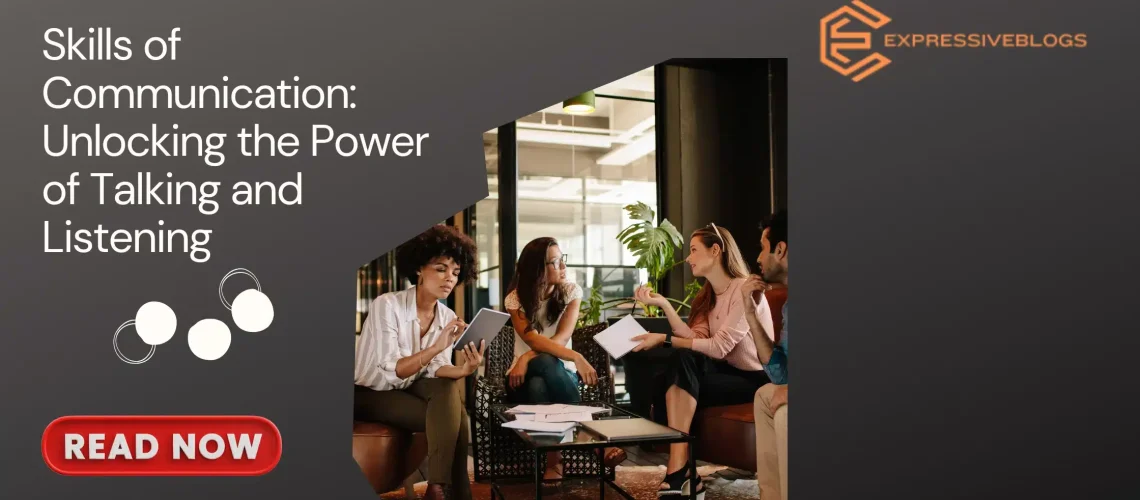Appreciation of Talent, it is Your ability to convey information, feelings and sentiments to individuals appropriately. Skills included may be vocal and written communication, listening, facial and other body language cues, and ability to change tactics. Another important element in the process of working in a team is communication since mutual collaboration, problem solving, building trust, and sharing important information require persuasive and efficient communication.
Skills of Communication
There are four main types of communication skills that you should master:
Verbal communication

This is the communication you make through spoken words as you express your ideas, opinions or feelings. The vocal communication skills are the selection of appropriate words, voice pitch, intensity, rhythm, timing for pauses, stress and, finally, utilisation of questions.
Non-verbal communication

This is the ability to demonstrate your feelings, attitudes or intention through the use of nonverbal cues such as hand movements, positions and postures, facial expressions, eye movements, and use of touch. Skills that are associated with nonverbal communication involve assessing signal for self, other, matching vocal and non-vocal signals, and even the aspects of context/ culture.
Written communication

This can be defined as the practice of writing, utilizing signs, figures, words or symbols to provide information, express thoughts or feelings. Other related areas of written communication are the aspects of using appropriate grammar, spelling, punctuation, and the correct words, structuring content, layout, and proofing work.
Visual communication

This has to do with the use of stickers, pictures, clip videos, illustrations, graph, chart, diagram, etc. to pass your information, ideas, or feelings. Visual communication includes choosing appropriate type, size, colour of the objects to be depicted and placing the objects in correct form with proper captions so that it is easily understood, attractive and meaningful.
ACTIVE LISTENING
Use active listening to ensure the information you and other people involved receive in the same way by paraphrasing instead of merely repeating. It makes people share their thoughts, feelings, and ideas easily, reduces cases of conflict within relationships or even groups since the parties involved properly understand what the other person is saying, and last but not least, fosters trust since the individuals can enjoy a mutual understanding that may have not existed before.
CONTEXTUAL COMMUNICATION
Be able to act orally, in writing, and through media in a wide range of settings relevant to various populations, persons, situations, environments, or sets of behaviors. This h includes other aspects such as professional, cross-cultural, online, academic, and crisis communication.
How to improve your skills of communication?
To improve your communication skills, you should practice the following tips:
Consider your audience
To practice good communication, it is important not to forget the key aspect of appreciating your target group. We need to invest time into evaluating whether it is us or the other party that is communicating, what it is that this party might need, want or strive for, and whether this party is open to receiving particular information in a specific form.
Think about the most effective way to convey your message
It is clear that the nature of communication is not the same in every country and between every two people. Different types and methods of communication are appropriate depending on different objectives and contexts. For example, you may communicate with the customer through business letter, a colleague in casual conversation or to the group of stakeholders in a business presentation.
Encourage feedback
As to the importance of feedback, or the need to receive information on whether or not you are getting through to the other person and whether or not there are areas you should improve on as far as your delivery is concerned. Still, it is crucial to receive information from the audience in addition to contributing to others with the information. Moreover, you need to be open to suggestions and heated feedbacks, then put it to good use with regard to your communication abilities.
Be respectful and empathetic
I always say that it’s important to treat other people the way you want to be treated in both respect and empathy. Do not be hostile and instead learn to honor the views, emotions, and perceptions that the audience has regardless of the disparity of opinions. You should also identify with your audience, in that you ought to examine the emotions that they are going through. You should abstain from using any salty language/profanity, any form of vulgar language, any form of language that would be impersonating anger or any form of language that’s going to be perceived as being insensitive.
conclusion
Altogether, it can be concluded that the skills of communication are encompassing the fundamentals of human’s interactions in the inevitable spheres of one’s life. Dharmaraj and Reddy (2012) assert that these are some of the attributes in the continuous learning process: active listening and empathy, clear communication and persuasive skills, assertiveness and cooperation, problem solving and conflict resolution, and rapport and credibility. Communication is not just spoken or written; it is all about the ability to capture the message, the talent to send it across and the skill of touching the heart to make one realises what has been said. Thus, through practicing these skills more and more, we equip ourselves to become professionals, partners, and citizens capable to work through interactions, to achieve in professions, to coexist effectively, and enrich the world with tolerance and compassion. Finally, juggle the peculiarities of the communicative abilities, and see the changes that can happen to the entire life sphere as a result.

